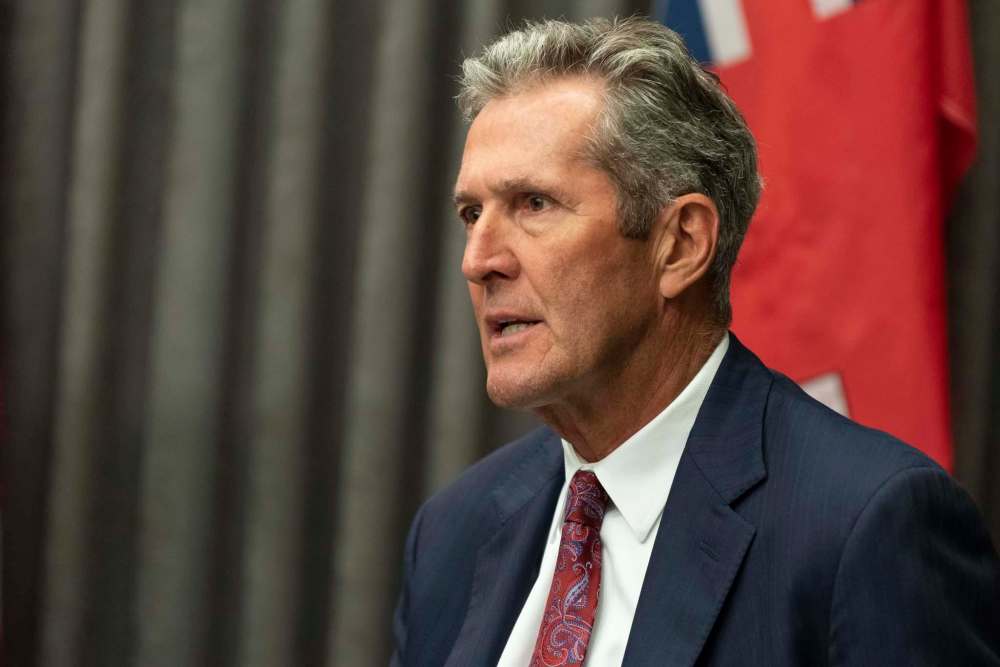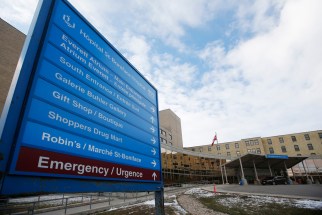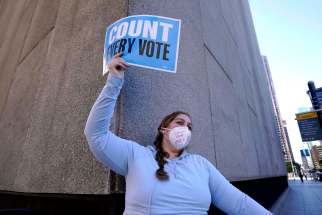‘Most generous’? Sorry, Mr. Premier Pallister incorrectly claims Manitoba's pandemic-assistance business benefits exceed any other province
Read this article for free:
or
Already have an account? Log in here »
To continue reading, please subscribe:
Monthly Digital Subscription
$0 for the first 4 weeks*
- Enjoy unlimited reading on winnipegfreepress.com
- Read the E-Edition, our digital replica newspaper
- Access News Break, our award-winning app
- Play interactive puzzles
*No charge for 4 weeks then price increases to the regular rate of $19.00 plus GST every four weeks. Offer available to new and qualified returning subscribers only. Cancel any time.
Monthly Digital Subscription
$4.75/week*
- Enjoy unlimited reading on winnipegfreepress.com
- Read the E-Edition, our digital replica newspaper
- Access News Break, our award-winning app
- Play interactive puzzles
*Billed as $19 plus GST every four weeks. Cancel any time.
To continue reading, please subscribe:
Add Free Press access to your Brandon Sun subscription for only an additional
$1 for the first 4 weeks*
*Your next subscription payment will increase by $1.00 and you will be charged $16.99 plus GST for four weeks. After four weeks, your payment will increase to $23.99 plus GST every four weeks.
Read unlimited articles for free today:
or
Already have an account? Log in here »
Hey there, time traveller!
This article was published 02/11/2020 (1866 days ago), so information in it may no longer be current.
Premier Brian Pallister has consistently touted the Tory government’s COVID-19 business-assistance programs as the “most generous” in the country.
A look at other provinces paints a different picture, however.
At a press conference Monday, Pallister repeated claims he had previously stated to the Free Press, when asked how businesses affected by mandatory shutdowns would be provided support under red- and orange-level pandemic restrictions.
“We put hundreds of millions of dollars out there already in benefits that exceed any other province,” said Pallister, referring to one-time loans such as the $6,000 Manitoba Gap Protection Program (currently offered only to businesses that don’t qualify for federal aid); the Back to Work subsidy offering 50 per cent reimbursements for wages paid to new employees hired after June; and Manitoba Public Insurance rebates of between $140 and $160.
“We want to keep our small-business community in a position to recover and we are doing that more than any other jurisdiction in the country.”

Here’s how other provincial governments are providing support for affected businesses to top off federal aid. Several of them far exceed Manitoba’s offerings — especially when considering COVID-19 case counts per capita and province-mandated restrictions:
British Columbia
A comprehensive range of financial assistance has been made available to businesses in British Columbia — including several loans, grants, provincial tax rebates, relief for utility payment and business pivot programs.
As of November, the Small and Medium-Sized Business Recovery Grant program continues to invest up to $300 million in targeted financial support for businesses in B.C. that employ between two and 149 residents and have experienced declines in revenue since March. Grants between $10,000 and $30,000 are available. An additional $5,000 to $10,000 grant is available to eligible tourism-related businesses. The program is expected to run until March 31, 2021, or until the funds are fully allocated — whichever comes first.
Encouraging the creation of new jobs, B.C.’s Increased Employment Incentive is offering a refundable 15 per cent tax credit for employers that are upping their payroll for existing low- or medium-income employees.
Alberta
The provincial government in Alberta has frozen education property taxes (saving nearly $32 million for businesses), and is providing eligible small companies and non-profits up to $5,000 as a one-time direct cash payment towards relaunch costs.
Hotels and other lodging providers can keep their tourism levy amounts this year, collected between March 1 and Dec. 31.
Workers Compensation Board premiums have been deferred until early 2021 for businesses in Alberta, with employers who have already paid being eligible for a rebate or credit. For small- and medium-sized businesses, the government is covering 50 per cent of their premium costs.
Saskatchewan
The Re-Open Saskatchewan Training Subsidy allows businesses to access up to $10,000 to provide existing employees with “training that supports economic recovery by addressing increased health and safety requirements,” according to the provincial government website. These costs could go towards any necessary COVID-19 protocols, including the purchase of personal protective equipment.
Also, the Saskatchewan Tourism Sector Support Program is providing financial assistance for tourism businesses that have seen a significant drop in sales revenue because of the pandemic. Funding available under the Accommodations and Major Event Facilities stream are between $10,000 and $50,000; and under the Event, Attractions and Tour Sector stream between $7,500 and $15,000.
Crown utilities are also allowing a zero-interest bill deferral for customers who can’t pay their bills because of COVID-19.
Ontario
Ontario is deferring Workplace Safety and Insurance Board premiums and expenses for employers, while temporarily reducing electricity rates for small businesses, farms, and residential customers.
In Southern Ontario, the regional Relief and Recovery Fund is providing businesses with interest-free loans of up to $40,000 or $500,000 under two different streams. Repayments for either stream aren’t required until December 2022 at the earliest.
Companies, corporations, co-operatives and Indigenous or First Nations organizations that are located or operating in northern Ontario can receive up to $250,000 as a conditionally repayable loan, with repayments beginning in 2022.
Quebec
Under the Assistance to Businesses in Regions on Maximum Alert program, the Quebec government is providing reimbursements of up to $15,000 for eligible enterprises. For essential and low-income earners, workers can also individually receive $100 per week.
Investissement Québec is providing writeoffs on a case-by-case basis for businesses on mortgages, rent collection, utilities, tax payments, permit fees and insurance. There is no limit on those, and can go up to $100,000 for tourism businesses, in particular.
Additionally, nearly $50,000 in emergency financing in the form of a loan or guarantee for businesses that have temporarily closed is available through the provincial government.
Nova Scotia
The provincial government is offering a $5,000 grant to help businesses in Nova Scotia open safely, and $1,500 business continuity vouchers for eligible companies.
Four different streams of funding for agricultural businesses are also available — with grants between $20,000 and $50,000. Funding does not need to be repaid under the COVID-19 Response and Mitigation Program, and is available for farms, agri-businesses, industry associations, licensed abattoirs and companies owned or operated by Mi’kmaq First Nations and other Indigenous groups.
Newfoundland and Labrador
Businesses in Newfoundland and Labrador can apply for a one-time, non-repayable contribution of $5,000, $7,500 or $10,000 to provide COVID-19 relief, used towards revenue losses and business adaptations as a result of pandemic restrictions.
Eligible small- and medium-sized tourism operators will also be able to apply for an additional non-repayable capital contribution of either $5,000 or $10,000 through the government.
There are currently no province-specific business supports in New Brunswick and Prince Edward Island, given their low COVID-19 case counts.
●●●
Despite a comparison to other areas in Canada, Pallister maintains the kind of business support offered in Manitoba “doesn’t exist anywhere else.”
On Monday, he told reporters the Tory government will continue to offer the same programs it has since the early days of the pandemic, but that an announcement may come “at some point” that will possibly expand those programs.
“What we’ve already announced is the most generous support,” said Pallister. “We plan to continue with those programs.”
Twitter: @temurdur
Temur.Durrani@freepress.mb.ca
History
Updated on Monday, November 2, 2020 7:06 PM CST: updates photo







